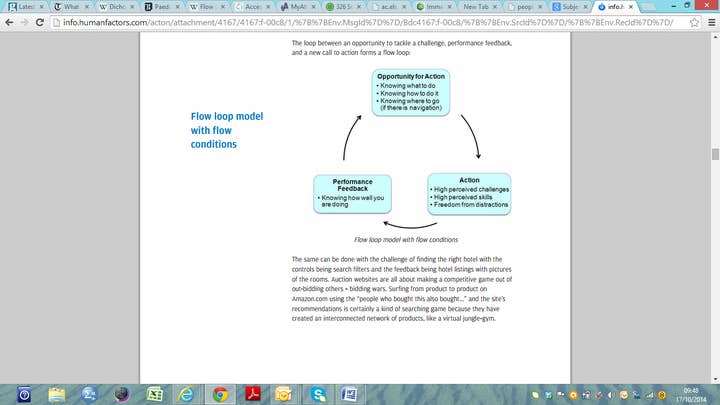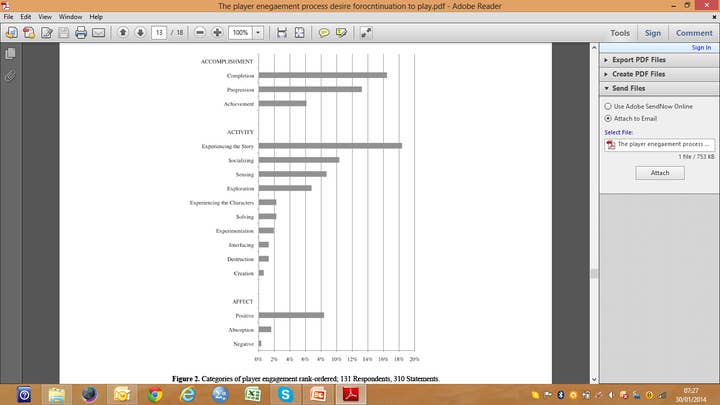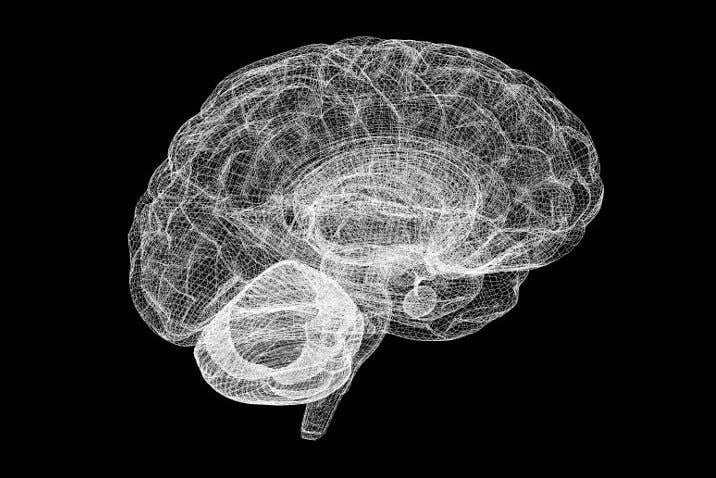Psychology of video game play - low hanging fruit!
Cyberpsychologist Berni Good explains the science behind flow
There are myriad ways that psychology can be used in an applied way throughout the game design and development process, yet it is often ignored. So underutilised is this area of applied science to game development that there remains ample low-hanging fruit for developers to grab, simply by designing and developing games around the psychology of the player. My experience of consulting in the industry over the last few years, specifically on the psychology of gaming, suggests that developers can gain an appreciable edge by applying data from models and theories derived from psychological research to steer the choices and decisions in games development. Learning how to apply knowledge and methodologies of psychology to games design and development. For example, in-game economies, leveraging player engagement, media character attachment and enhancing group-flow are all examples of how to literally take what we know about human behaviour and apply it to game design. This is probably why more and more psychologists are working in the industry and why some of the industry heavyweights such as Ubisoft and Valve have psychologists on their staff.
So where to start? First it's important to distinguish the difference between marketing or business advice and actual psychology. Sounds simple right? Well, not in my experience. One developer recently told me they had previously used a psychologist as a consultant. I asked who, knowing that there are really only a very small amount of psychologists that specialise in this area. It turns out it was a marketing/business consultant who specialises in the industry and was consulting about some pseudo-science that he called psychology around player types. Now, that is fine, but how do we really move the experience forward from an objective psychological perspective for the player, without really using objective scientific research methodology and resources?
"First it's important to distinguish the difference between marketing or business advice and actual psychology"
There is a wealth of academic research available and critically evaluating it is the key to understanding what elements of this objective research can be used by developers in an applied way. The first step is getting developers to familiarise themselves with the psychological research that is available, rather than the marketing claims. Of course, marketing advice has a place in the development process and sell through, but using psychology at the very get go, the stage of concept and prototyping, will not only allow for more immersive and enjoyable gaming experience for the player but will also enable a road map for the developer so they can avoid developing games from a subjective perspective.
For starters, I would highly recommend a very well put together review of the psychological research around flow, engagement and immersion in video games by Boyle et al (2012). They initially uncovered nearly 20,000 papers related to engagement and then drilled this number down to 55 key papers to review. Describing flow as the most influential construct used to explain the subjective emotional experience and optimal state of pleasure experienced in video game play, the paper highlights the importance of flow for video game enjoyment. Building strategies for flow into games is a hard task, largely because flow is quite subjective. Csíkszentmihály (the originator of the concept of flow) refers to the state as an autotelic activity.
Flow activities are their own rewards in most cases, the actual end goal really is focused on less than the task at hand, or an excuse for the process! One of the key areas of Flow that is not always clearly explained is that it's about step by step momentary goals rather than the overall goal at the end. Developers can overcome this by ensuring that flow strategies are built into their games by including flow loops. In a recent white paper about flow, Owen Schaffer (2013) describes flow loops as "Creating challenges that are neither too easy, nor too difficult. It means giving immediate feedback that allows users to continuously adjust their performance as they tackle these challenges." See the model he has developed below. Note the word 'perceived' - so much of psychology is about perception!

Though flow is actually quite a complex construct, developers can enhance this state in the player by ensuring that there are clear, perceived challenges that stretch one's skills. Even if that's lining up candy in rows, clear and reachable goals allow for immediate feedback. I rather like the Flow Short Scale (Rheinberg et al, 2003) which measures flow with 10 items (answer on a 7-point Likert scale). It's been validated and used extensively by researchers and can be used in an applied way by developers. Questions range from 'I don't notice time passing' to 'I know what I have to do each step of the way'. It is an incredibly useful scientific tool for measuring flow very early on in design, allowing for iterations.
"One particularly interesting area of research I am looking at with a developer at the moment is the concept of Group Flow, which is really important for social game play and multiplayer games"
One particularly interesting area of research I am looking at with a developer at the moment is the concept of Group Flow, which is really important for social game play and multiplayer games. Researchers from Edge Hill University are studying Group Flow, looking at solo versus group flow dynamics. They suggest that collective competence opportunities are built into the game, so that the group's skills and development are at play. Sharing the sense of belonging, allowing each member to have a specific role, achievements in the group and leaderboards are all valuable strategies. Both the concept of flow and group flow tap into the basic intrinsic psychological needs which we will now explore.
Self Determination Theory
Flow taps into the state of competence, and group flow in particular taps into our need for relatedness. These intrinsic psychological needs have been well researched in games by Rigby and Ryan (2011) whose book 'Glued to Games' (highly recommended) allows for a step by step guide for developers to build into games ways to address the player needs. They base their work around a really great theory in psychology called Self Determination Theory (SDT). This is the strand of psychology to do with happiness and well-being. By designing games that meet these needs, developers will see increased desire for continuation to play, as well as improved brand loyalty.
Relatedness
The first component of SDT is relatedness. In games, this intrinsic need can be fulfilled by social multiplayer, social networking, playing with pals and even relating to characters in a game, and can contribute to a player's motivation and enjoyment. Feedback from NPCs is important, as well as leaderboards and comments on social networking. NPC's giving the player the opportunity to feel relevant is an important strategy to build into the game. Recognising and acknowledging the accomplishments of the player will all add to this sense of relating. (Rigby & Ryan, 2011)
"NPC's giving the player the opportunity to feel relevant is an important strategy to build into the game. Recognising and acknowledging the accomplishments of the player will all add to this sense of relating"
Competence
Competence within SDT looks at opportunities for individuals to acquire new skills or be challenged and receive positive contextual feedback. This fulfils intrinsic motivation. Competence can be defined as feeling a sense of effectiveness (Rigby & Ryan, 2011). People are intrinsically motivated to pursue opportunities to feel competent, because feeling effective gives us energy and further motivation. Mastering the mechanics of game play and accomplishing achievements via levels or tasks in game play enables this sense of competence, which in turn adds to the feeling of well-being.
Autonomy
Autonomy within SDT is all about meaningful choices and volitional action, which in turn enhance well being and intrinsic motivations. Playing video games is usually voluntary. Rigby & Ryan (2011) suggest that when playing video games a person's autonomy will already be high, and depending on the decisions within the game play that allow choice of direction autonomy can be enhanced. Within video game play an example of autonomy would be different paths to take, different areas to play in and directions in game play to take. What to buy in the game? How much to spend? What weapons etc.
Character Attachment
Whilst the conditions for flow will be different for each game, genre and platform, there is another psychological phenomenon that can enhance this state when it comes to game design around character attachment and identification. When a person is in a state of flow they often lose awareness of themselves as a social actor. This can enhance relatedness to characters and NPC's. This fascinating area of psychological research can help developers to increase immersion of the game play with good character development. The compelling feeling of flow can impact on motivation to play and generate a cathartic release it can also impact on our sense of self during play, especially when focusing on the character relatedness aspect.
"Psychologists now know that we can suspend our sense of self in virtual worlds: there is no doubt that gamers identify with characters in game play"
Psychologists now know that we can suspend our sense of self in virtual worlds: there is no doubt that gamers identify with characters in game play. When we think about identification, we look to psychoanalysts such as Freud, who explain the process of one's own formation of personality (self identification) by taking on the role of another. Since Freud's work, other researchers (such as Cohen, 2001) have progressed to studying this phenomenon in media characters in both films and games whereby the person identifies with a media character, vicariously taking on the 'role-play' of the character. What's happening here is that the player or viewer temporarily puts himself in the place of the character and believes, certainly momentarily, that what is happening to the character is happening to him.
Put another way, it's about viewing the world through someone else's eyes or being in someone else's shoes. Cohen's work looks at viewer identification with media characters suggesting that character identification involves an "increasing loss of self-awareness and its temporary replacement with heightened emotional and cognitive connections to the character." If we relate this to gaming it would suggest that gamers do put themselves in the role of the character, suspending their sense of self in these virtual worlds.
When we think about the interactive nature of video games this becomes even more apparent. A team of researchers from Singapore (Dong et al, 2013) last year looked at original components of Cohen's work and applied it to video games, in particular, the sharing of feelings between the player and the character. For example, a player feeling sad if things didn't go well for the character, suggesting an emotional connection in that the player would 'know' exactly what the character was going through.
There is research to suggest a merging of self and the character too. This is another phenomenon that's happening. Psychologists have uncovered that when the disinhibition effect (the idea that people's inhibitions are lowered in virtual environments) kicks in, it's completely plausible that people will actually feel as if they are the character they are playing. In this sense, the player could see characters as identifiably human beings that they want to aspire to be or to know. This gives a real insight to developers about the personality of the characters they are creating.
"Psychologists have uncovered that when the disinhibition effect kicks in, it's completely plausible that people will actually feel as if they are the character they are playing"
Making sure there is some type of emotional connection can really enhance the experience for the player. Players do have strong emotional reactions to a character. Add the concept of flow into this mix, whereby the player is completely immersed in the game play, and very real emotions, possibly even stronger than feelings offline, may be taking place. Players may even be bonding to the character in the way (or even more strongly) that people bond with each other offline. Just knowing this phenomenon can help those in the industry who develop these characters, allowing them to really go to town on how the character looks and reacts emotionally. It also enables developers to monetise IAPs around the player by providing the character with various accoutrements and power and strength.
Results from Schoenau-Fog's (2011) work around developing a framework for player engagement (detailed below) suggest that when it comes to people wanting to keep playing a game, experiencing the character ranks higher than destruction in game play (killing enemies, destroying structures and building etc.,) This research suggests that we want to develop and evolve with the character and experience what happens to them and if there is not enough of this activity players may not want to continue playing. This suggests that the more a player can relate to the character, the more a player will want to play a game. Interestingly, this is in accordance with other research around purchasing F2P games items.

Monetisation
Developers can also look at psychology to understand what gamer's needs are around their perception of value in F2P and IAP. Monetising gaming experiences that are fair to the gamer will always pay long-term dividends in terms of gamer loyalty. Some really great research by Park & Lee, (2011) around F2P in South Korea explores the value of purchasing game items from the gamer's perspective. Their research revealed that gamers will pay for IAP based on the perceived value they get. For example, they found that character competency was important to the player and that they would perceive good value on a purchase if it improved the competency of the character, by improving his or her strength and power, say. They also looked at other value components, such as monetary value. Players perceived good value if they got a cost effective solution at a reasonable price.
I think that gamers as consumers are just as switched on as any other consumer. Developers need to be careful how they monetise so that they don't get disengagement. I really believe that gamers just want transparency up front when it comes to spending their money. This is an area I am currently researching so I will let you know the findings. How to price game items accurately to match the perceived value is very important to developers and this is just another great example of how psychology can help developers understand gamer behaviour from a consumer psychological perspective.
The examples above are just a sample of the sort of psychological research that has been tried and tested numerous times; there are other great models and theories that have worked too. I have also worked with some models and theories in psychological academic research that frankly have not succeeded in an applied way. Many years collecting and critically reviewing the literature, (coming through the British Psychological Society's degree course is very good grounding for knowing which methodologies work and which do not and seeing flaws in the research!) working in the industry and being a gamer myself does give a sense of what will work and what will not. To me, it is clear that there are lessons which developers can learn from looking at psychological objective scientific ways to understand player behaviour. Couple this with analytics and real shifts can occur in the process. More importantly, understanding the psychology of video game play allows for the creative juices to flow: something which happens every time I have worked with developers, and something thrilling to see.
Berni Good BSc(Psych) MSc MBPsS is the owner of Cyberpsychologist, which offers consultation and bespoke user experience solutions firmly based on the psychology of the gamer.








